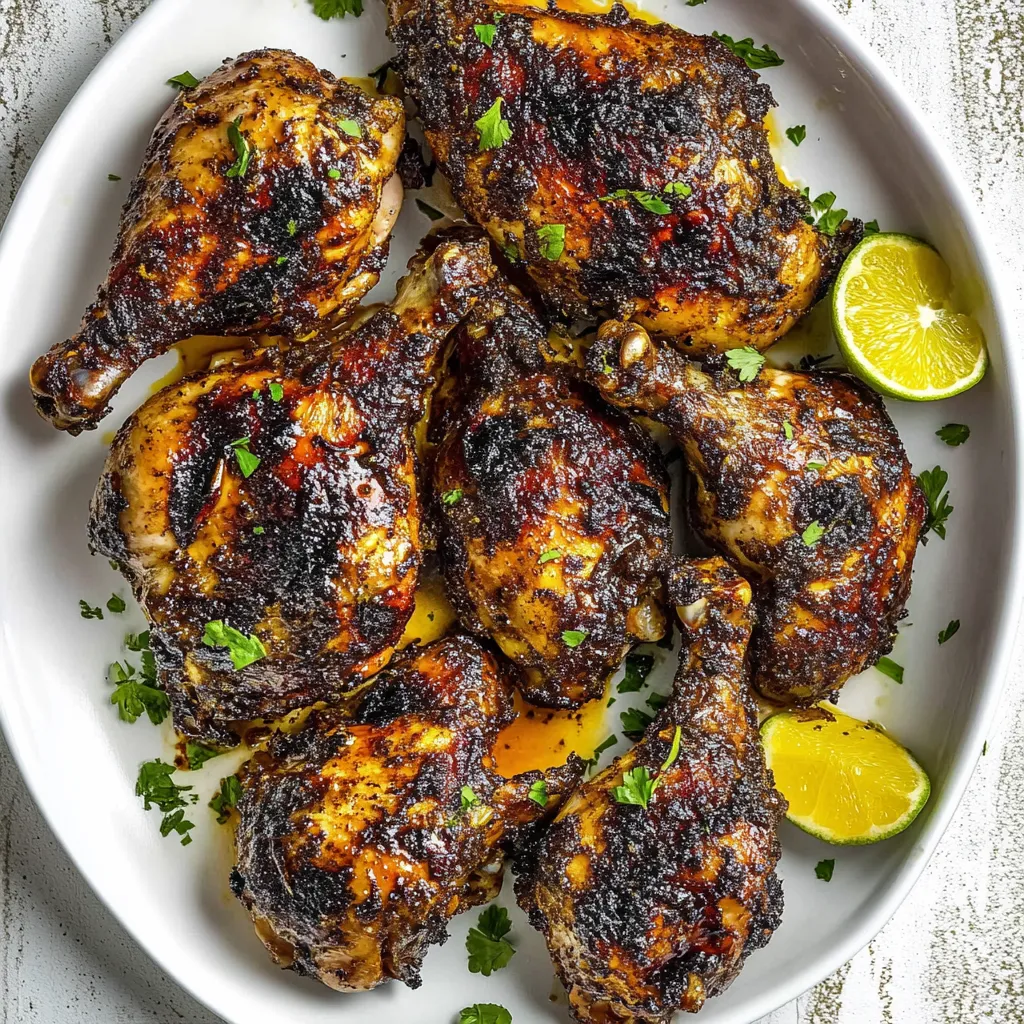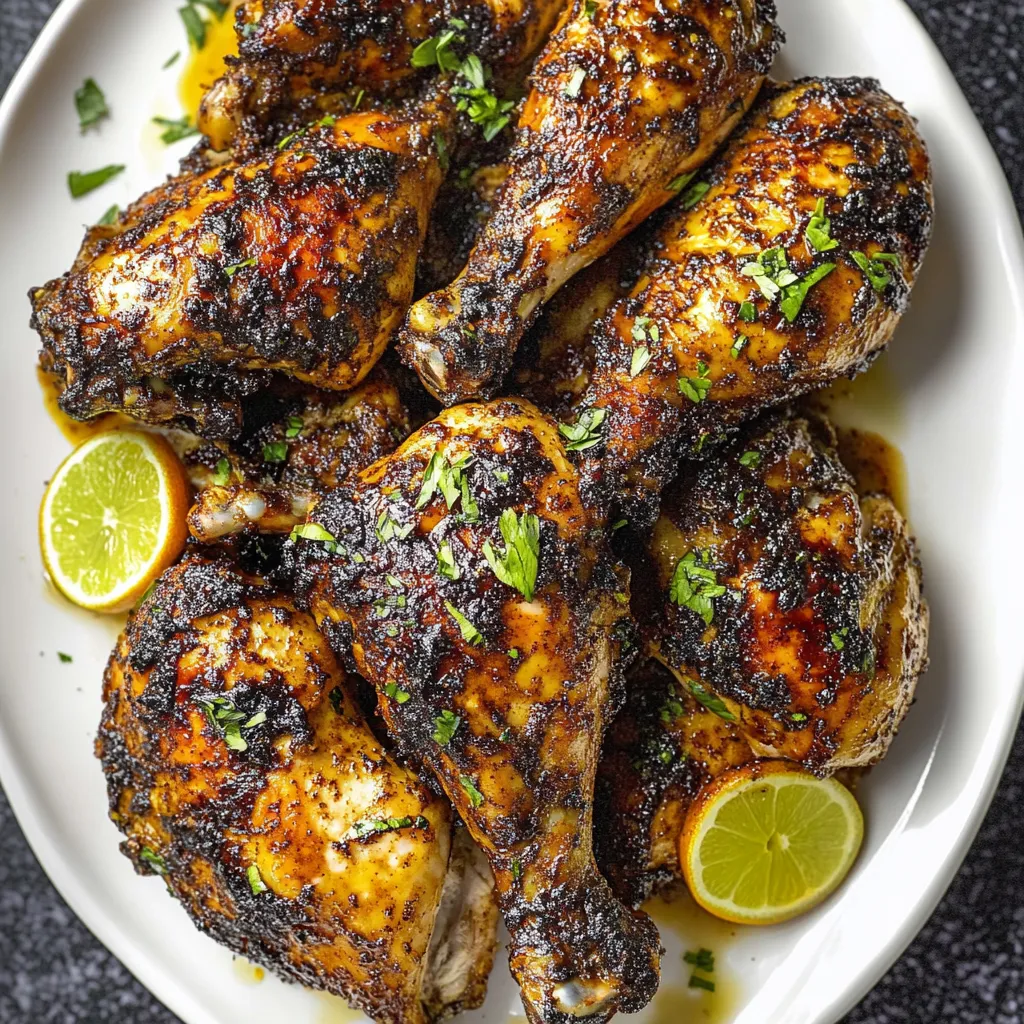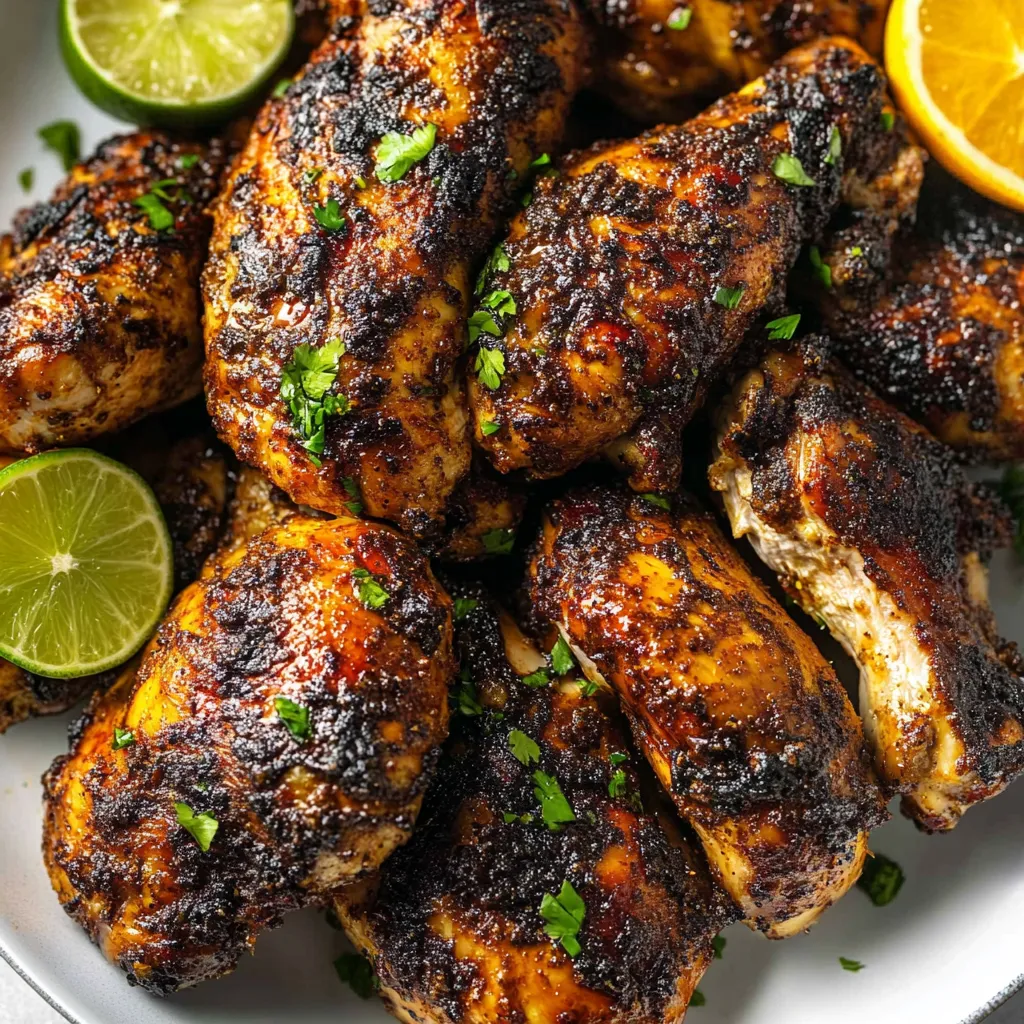 Pin it
Pin it
This authentic Jamaican jerk chicken delivers bold Caribbean flavors with a fiery scotch bonnet pepper marinade that infuses every bite with incredible spice and complexity. Whether grilled over charcoal for that traditional smoky flavor or baked in the oven for convenience, this recipe creates tender, flavorful chicken that brings the vibrant taste of Jamaica to your dinner table.
This Jamaican jerk chicken has become my absolute favorite way to bring Caribbean flavors into my kitchen because it delivers that perfect balance of heat, sweetness, and aromatic spices that makes every bite exciting. I love how the traditional "jerking" method of piercing the meat allows all those incredible flavors to penetrate deeply, creating chicken that's seasoned throughout rather than just on the surface. The scotch bonnet peppers provide that authentic heat that spice lovers crave while the combination of citrus and warm spices creates incredible complexity.
Ingredients and Why They Matter
- Scotch bonnet or habanero peppers: provide the signature heat and fruity flavor that's essential for authentic jerk chicken
- Red onion and scallions: add sweetness and sharpness that balance the heat while contributing to the marinade's complexity
- Fresh garlic and ginger: create the aromatic foundation that enhances all the other flavors
- Soy sauce and vinegar: provide umami depth and acidity that help tenderize the meat while adding flavor
- Orange and lime juice: bring citrus brightness that balances the heat and adds tropical freshness
- Brown sugar: adds necessary sweetness that balances the spice and helps create beautiful caramelization
- Allspice berries, nutmeg, and cinnamon: contribute those warm, aromatic spices that are essential to jerk seasoning
- Fresh thyme: adds herbal notes that are traditional in Jamaican cooking
Step-by-Step Instructions
- Prepare the jerk marinade:
- In a food processor, combine 2-3 scotch bonnet peppers (seeded for less heat if desired), 1 medium red onion (quartered), 4 garlic cloves, 3 scallions (chopped), 2 tablespoons fresh grated ginger, 1/4 cup soy sauce, 1/4 cup white vinegar, 2 tablespoons olive oil, 1/4 cup orange juice, 2 tablespoons lime juice, 2 tablespoons brown sugar, 1 teaspoon ground allspice, 1/2 teaspoon nutmeg, 1/2 teaspoon cinnamon, 2 tablespoons fresh thyme leaves, 1 teaspoon salt, and 1/2 teaspoon black pepper. Process until smooth.
- Pierce the chicken:
- Using a sharp knife, make small deep cuts all over 3-4 pounds of chicken pieces (or a whole cut-up chicken). This traditional "jerking" technique allows the marinade to penetrate deeply into the meat for maximum flavor.
- Marinate the chicken:
- Place the pierced chicken in a large bowl or resealable bag. Pour the marinade over the chicken and massage it in thoroughly, making sure every piece is completely coated. Cover and refrigerate for at least 2 hours, though overnight marinating produces the best results.
- Prepare for cooking:
- Remove chicken from refrigerator 30 minutes before cooking to bring to room temperature. Preheat your grill to medium-high heat or your oven to 400°F. Remove chicken from marinade and discard the used marinade.
- Grill the chicken (traditional method):
- Oil the grill grates well and grill the chicken pieces for 12-20 minutes, turning once, until the internal temperature reaches 165°F. The skin should be nicely charred and caramelized.
- Or bake the chicken:
- Place chicken on a baking sheet lined with parchment paper. Bake for 35-40 minutes, or until the internal temperature reaches 165°F and the skin is golden brown and slightly crispy.
- Rest and serve:
- Let the chicken rest for 5 minutes before serving. Finish with a squeeze of fresh lime juice and serve immediately while hot.
 Pin it
Pin it
I learned through making this recipe many times that the quality and freshness of your spices makes an enormous difference in the final flavor. When I used old, stale allspice and thyme, the chicken lacked that vibrant, complex taste that makes jerk chicken so special. Now I always check that my spices are fresh and aromatic, and I buy whole allspice berries to grind myself when possible for the most intense flavor.
Understanding Traditional Jerk Cooking
The term "jerk" originally referred to the technique of piercing meat with sharp objects to allow marinades and seasonings to penetrate deeper into the protein. This method was developed by the Maroons in Jamaica as a way to preserve and flavor meat in the tropical climate. The combination of hot peppers, aromatic spices, and acidic ingredients created both incredible flavor and natural preservation.
Modern jerk cooking has evolved to encompass not just the technique but the distinctive flavor profile that combines fiery heat with sweet, aromatic, and acidic elements. The scotch bonnet pepper is central to authentic jerk flavor - it provides not just heat but a distinctive fruity sweetness that can't be replicated with other peppers, though habaneros make an acceptable substitute.
Mastering the Marinade Balance
The key to exceptional jerk chicken lies in balancing the five flavor elements: heat from the peppers, sweetness from brown sugar and fruit juices, acidity from vinegar and citrus, aromatics from garlic and ginger, and warmth from the traditional spices. Each element serves a purpose beyond just flavor - the acid helps tenderize the meat, the sugar promotes caramelization, and the oil helps distribute fat-soluble flavors.
The marinade should taste bold and intense on its own because it needs to penetrate the meat and compete with the natural chicken flavors. Don't be afraid of it seeming too strong when you taste it - much of that intensity will mellow during the marinating and cooking process while still delivering incredible depth of flavor.
Achieving Perfect Heat Levels
Scotch bonnet peppers vary significantly in heat level, so it's important to taste and adjust accordingly. For those new to jerk chicken, start with one pepper and remove the seeds and membranes, which contain the most capsaicin. You can always add more heat, but you can't take it away once it's in the marinade.
For serious heat lovers, use the whole peppers including seeds, or add additional peppers to reach your desired spice level. Some cooks like to reserve a portion of the marinade before adding the chicken, then heat it separately as a finishing sauce for those who want extra heat and flavor intensity.
Grilling vs. Baking Techniques
Traditional jerk chicken is cooked over pimento wood or charcoal, which adds smoky flavor that complements the spice blend beautifully. If grilling, medium-high heat works best to cook the chicken through while developing that characteristic charred exterior. The sugars in the marinade can burn easily, so watch carefully and move pieces to cooler areas if they're browning too quickly.
Baking produces excellent results when grilling isn't possible, and it's more forgiving for beginners. The oven's even heat ensures the chicken cooks through completely while still developing good color. For extra flavor, you can finish baked chicken under the broiler for a few minutes to achieve some of that charred appearance.
Traditional Serving and Accompaniments
Jerk chicken is traditionally served with rice and peas (kidney beans), festival (fried dumplings), or plain steamed rice that helps balance the heat. The starchy sides provide relief from the spice while allowing you to enjoy more of the flavorful chicken. Fresh tropical fruits like mango or pineapple also complement the heat beautifully.
A simple salad with citrus dressing or pickled vegetables provides cooling contrast to the rich, spicy chicken. Beer or fruit-based drinks are traditional beverages that help tame the heat while enhancing the overall Caribbean dining experience.
Food Safety and Storage
When working with hot peppers, wear gloves or wash your hands thoroughly with dish soap immediately after handling to avoid accidentally touching your eyes or other sensitive areas. The capsaicin oils can linger on your skin for hours and cause painful burning if transferred to sensitive areas.
Leftover jerk chicken keeps well in the refrigerator for up to five days and actually tastes great cold or reheated. The flavors continue to develop even after cooking, making leftovers often taste even better than the original meal. The chicken also freezes well for up to three months if properly wrapped.
 Pin it
Pin it
This Jamaican jerk chicken has taught me that authentic ethnic cuisines often achieve their distinctive character through the careful balance of seemingly opposing flavors - the way the sweetness tempers the heat, the acid brightens the rich spices, and the aromatics tie everything together into something greater than the sum of its parts. Every time I make this recipe, I'm transported to the vibrant flavors of the Caribbean and reminded that some of the most memorable meals come from understanding and respecting traditional cooking methods that have been perfected over generations.
Frequently Asked Questions
- → How long should I marinate the jerk chicken?
- Marinate for at least 2 hours, but overnight gives the best flavor. The longer you marinate, the more the spices penetrate the meat.
- → Can I use different peppers instead of Scotch bonnets?
- Yes, you can use habaneros or jalapeños if you can't find Scotch bonnets. Adjust the amount based on your heat preference.
- → Is this recipe very spicy?
- It has mild to medium heat. The marinade tones down the pepper heat, but you can add more peppers if you want it spicier.
- → Can I bake this instead of grilling?
- Absolutely! Bake at 400°F for 35-40 minutes until the internal temperature reaches 165°F. Both methods work great.
- → What should I serve with jerk chicken?
- Rice and beans, plantains, coleslaw, or grilled vegetables are perfect Caribbean-style sides that complement the spicy flavors.
- → How do I know when the chicken is done?
- Use a meat thermometer to check that the internal temperature reaches 165°F. The juices should run clear when pierced.
